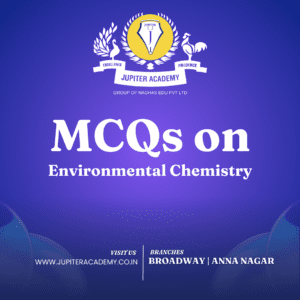NEET mcqs on environmental chemistry

Environmental chemistry is an important part of the NEET exam syllabus. It covers a wide range of topics, including:
- Environmental pollution: air pollution, water pollution, soil pollution, and noise pollution
- Chemical reactions in the atmosphere: smog, acid rain, ozone depletion, and global warming
- Pollution caused by industrial wastes
- Green chemistry
- Pollution control strategies
Environmental chemistry is important for the NEET exam because it is a relevant and timely topic. The NEET exam is designed to test students’ knowledge and understanding of concepts that are important for a career in medicine. Environmental chemistry is an important area of study for medical professionals because it helps them to understand the causes and effects of environmental pollution on human health.
In addition, environmental chemistry is a relatively easy topic to understand and score well on. The concepts are straightforward and the material is well-covered in most NEET preparation books and online resources.

Here are some NEET 2024 (National Eligibility cum Entrance Test) multiple-choice questions (MCQs) on environmental chemistry with answers:
1. Which of the following is a primary greenhouse gas responsible for global warming?
a) Oxygen (O2)
b) Carbon dioxide (CO2)
c) Nitrogen (N2)
d) Hydrogen (H2)
**Answer: b) Carbon dioxide (CO2)**
2. Acid rain is mainly caused by the emissions of:
a) Carbon monoxide (CO)
b) Sulfur dioxide (SO2) and nitrogen oxides (NOx)
c) Methane (CH4)
d) Ammonia (NH3)
**Answer: b) Sulfur dioxide (SO2) and nitrogen oxides (NOx)**
3. The ozone layer is located in which layer of the Earth’s atmosphere?
a) Troposphere
b) Stratosphere
c) Mesosphere
d) Thermosphere
**Answer: b) Stratosphere**
4. Which of the following pollutants is a major contributor to smog formation in urban areas?
a) Carbon dioxide (CO2)
b) Methane (CH4)
c) Ground-level ozone (O3)
d) Nitrogen gas (N2)
**Answer: c) Ground-level ozone (O3)**
5. The process of converting waste materials into reusable materials is known as:
a) Recycling
b) Incineration
c) Landfilling
d) Composting
**Answer: a) Recycling**
6. What is the main greenhouse gas released from the burning of fossil fuels for energy production?
a) Carbon dioxide (CO2)
b) Methane (CH4)
c) Nitrous oxide (N2O)
d) Hydrofluorocarbons (HFCs)
**Answer: a) Carbon dioxide (CO2)**
7. Which of the following pollutants is associated with the “hole” in the ozone layer?
a) Carbon dioxide (CO2)
b) Chlorofluorocarbons (CFCs)
c) Sulfur dioxide (SO2)
d) Nitrogen oxides (NOx)
**Answer: b) Chlorofluorocarbons (CFCs)**
8. What is the primary source of indoor air pollution in homes?
a) Radon gas
b) Carbon monoxide (CO)
c) Outdoor air pollution
d) Formaldehyde
**Answer: a) Radon gas**
9. Which environmental issue is associated with the excessive use of synthetic fertilizers and runoff into water bodies?
a) Acid rain
b) Eutrophication
c) Ozone depletion
d) Greenhouse effect
**Answer: b) Eutrophication**
10. The pH scale is used to measure the acidity or alkalinity of a substance. Which of the following pH values represents a neutral solution?
a) pH 0
b) pH 7
c) pH 14
d) pH 5
**Answer: b) pH 7**
These questions should help you test your knowledge of environmental chemistry for the NEET exam. Make sure to study the subject thoroughly and practice more questions to improve your understanding.
These are some JEE 2024 multiple-choice questions (MCQs) on environmental chemistry along with their answers. Here are a few:
1. What is the primary greenhouse gas responsible for global warming?
a) Oxygen (O2)
b) Nitrogen (N2)
c) Carbon dioxide (CO2)
d) Methane (CH4)
Answer: c) Carbon dioxide (CO2)
2. Which of the following is a non-renewable source of energy that contributes to air pollution?
a) Solar energy
b) Wind energy
c) Fossil fuels
d) Hydroelectric power
Answer: c) Fossil fuels
3. Acid rain is primarily caused by the emissions of which gases into the atmosphere?
a) Oxygen and nitrogen
b) Carbon dioxide and water vapor
c) Sulfur dioxide and nitrogen oxides
d) Methane and ammonia
Answer: c) Sulfur dioxide and nitrogen oxides
4. What is the process by which plants absorb water and release it into the atmosphere as water vapor?
a) Transpiration
b) Respiration
c) Photosynthesis
d) Precipitation
Answer: a) Transpiration
5. Which of the following pollutants can lead to the formation of the ozone hole in the Earth’s stratosphere?
a) Carbon monoxide (CO)
b) Sulfur dioxide (SO2)
c) Chlorofluorocarbons (CFCs)
d) Nitrogen dioxide (NO2)
Answer: c) Chlorofluorocarbons (CFCs)
6. The term “e-waste” refers to:
a) Ecological waste
b) Energy waste
c) Electronic waste
d) Efficient waste
Answer: c) Electronic waste
7. Which of the following pollutants is a major contributor to smog formation in urban areas?
a) Carbon dioxide (CO2)
b) Methane (CH4)
c) Volatile organic compounds (VOCs)
d) Hydrogen peroxide (H2O2)
Answer: c) Volatile organic compounds (VOCs)
8. What is the main greenhouse gas produced by the decomposition of organic matter in landfills?
a) Methane (CH4)
b) Carbon dioxide (CO2)
c) Nitrous oxide (N2O)
d) Sulfur hexafluoride (SF6)
Answer: a) Methane (CH4)
9. Which of the following pollutants can lead to the formation of “acid mine drainage” in areas with mining activities?
a) Carbon dioxide (CO2)
b) Mercury (Hg)
c) Sulfuric acid (H2SO4)
d) Nitrogen oxides (NOx)
Answer: c) Sulfuric acid (H2SO4)
10. What is the term for the process by which pollutants are removed from a gas stream by passing it through a liquid or solid material?
a) Filtration
b) Absorption
c) Adsorption
d) Combustion
Answer: b) Absorption
These questions cover various aspects of environmental chemistry and can serve as a starting point for your preparation.
Here are some specific examples of how environmental chemistry topics can be tested in the NEET exam:
- Multiple choice questions: Students may be asked to identify the different types of air pollutants, the causes of acid rain, or the effects of ozone depletion.
- Short answer questions: Students may be asked to explain the chemical reactions that occur in smog formation, or to describe the process of bioremediation.
- Long answer questions: Students may be asked to discuss the impact of environmental pollution on human health, or to evaluate the different methods of pollution control.
Overall, environmental chemistry is an important topic for students who are preparing for the NEET exam. It is a relevant and timely topic that is relatively easy to understand and score well on.
JEE mcqs on environmental chemistry JEE mcqs on environmental chemistry JEE mcqs on environmental chemistry JEE mcqs on environmental chemistry JEE mcqs on environmental chemistry JEE mcqs on environmental chemistry JEE mcqs on environmental chemistry JEE mcqs on environmental chemistry JEE mcqs on environmental chemistry JEE mcqs on environmental chemistry
NEET mcqs on environmental chemistry NEET mcqs on environmental chemistry NEET mcqs on environmental chemistry NEET mcqs on environmental chemistry NEET mcqs on environmental chemistry NEET mcqs on environmental chemistry NEET mcqs on environmental chemistry NEET mcqs on environmental chemistry NEET mcqs on environmental chemistry NEET mcqs on environmental chemistry


